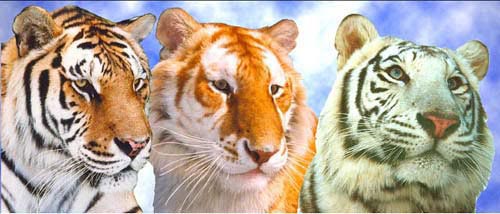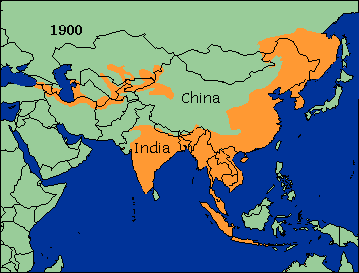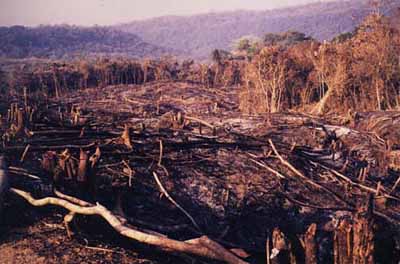Tigers as Conservation Ambassadors
Most people do not realize that we are in the midst of a mass extinction that is affecting every living thing on
this planet. We are losing up to a dozen species of plant and animal every day. This rate is far faster than
when the dinosaurs died out 65 million years ago. A stunningly beautiful animal like a tiger captures people's
attention so they become more willing to learn about critical conservation issues. Tigers are an important living
example of the environmental problems facing the world, which makes them the perfect wildlife ambassadors. Wild
tigers are currently on the brink of extinction. Due to rampant habitat destruction and poaching we may be losing
a tiger a day.

The unique colors of certain tigers attract an even greater amount of public attention. Therefore, Royal white and golden
tabby tigers assume a more important role as ambassadors for conservation issues. We have found that after an up-close,
uncaged experience with these tigers, people are willing to learn about the increasing global issues and possible solutions
to save our planet's biodiversity.
Many tiger conservation programs have focused their funding on the five remaining subspecies of tigers: Siberian, Indochinese,
South Chinese, Sumatran, and Bengal. However, recent genetic evidence suggests that there are only two truly unique
subspecies or types of tigers, Sumatran and Bengal. This should allow for a more unified conservation effort for tigers
by eliminating the thinking that created a division in which conservation programs were more about National borders than
about the Big Cats themselves. Tigers are residents of planet Earth and do not recognize man made boundaries. Present
efforts may not be enough to save them, but while they are still here, tigers with their beauty and physical prowess
are helping to conserve what biodiversity remains by assisting us as conservation ambassadors.

Tiger population and habitat loss from 1900 - 1990
The Myth of the Wild
At the turn of the century there was a human population of 1.5 billion. By the year 1960 we had increased
to 3 billion. Today there are 6.5 billion of us and we are already feeling the increasing strain on our natural
resources. At our current rate of expansion there will be over 9 billion people by the year 2015. The wilderness
that once covered this planet is quickly disappearing. We have already cut down over half of the world's forests.
The remaining wild ecosystems are under siege, including the protected reserves setup for wild animals like tigers.

Endangered wild animals are currently being poached at an alarming rate, usually by poison or snare. The very
idea of the "wild" is a myth because there are so few truly wild areas left. In Africa and Asia most of the
"wild animals" live in managed reserves, enclosed by either fences or an encroaching human population. These
animals are guarded and often fed. Their freedom is restricted and their natural behavior is extinguished. These animals
are in every sense as captive as the animals maintained in responsible zoological facilities.
Omega Point
We are quickly nearing "Omega Point", the point of no return. This is when the devastation we have
inflicted on our life supporting ecosystems finally becomes irreversible and they begin to fail. At the current rate of mass
species extinction, Omega Point could occur in the next 10 to 15 years. Not only is the biodiversity of our planet at risk,
so are we. There is a real danger our kids and grandkids will live in a world where wild tigers, rhinos and condors are only
memories. For many of our already endangered wildlife species to survive into the future, captive-breeding programs will play
a critical role.
 Satellite photo of the rainforests of Brazil. The little white patches
Satellite photo of the rainforests of Brazil. The little white patches
are the clouds and the dark green is the remaining forest.
How You Can Help
Since the year 1999, human consumption worldwide has surpassed the Earth's ability to replenish itself
by 20%. People are converting the earth's biomass into human mass at a constantly expanding rate. This has a profound
impact on not only every species on Earth, but on the planet itself.
We must take an active stand to lower our consumption and control our population: Reduce what we use,
reuse what we can and recycle the rest.
There are some other simple things that we can all do to help conserve the limited resources of this
planet.
*Stay informed. Visit zoos. View nature programs. Read books, magazines, and web sites on conservation.
*Share what you've learned with family and friends.
*Join an organization that makes a difference in conservation.
*Volunteer your time at a zoo, nature center, park, aquarium, or museum where you live.
*Recycle and buy recycled products.
*Install water-saving devices and adopt habits that conserve water in your home. Turn off the tap.
*Turn off lights when you leave a room and encourage others in your house to do the same.
*Consider a vegetarian diet. It takes 5 - 10 pounds of grain to produce one pound of meat.
*Landscape for local wildlife including using plants native to your area.
*Consider creating a Backyard Wildlife Habitat and having it certified by the National Wildlife Federation.
For more information visit their website at www.nwf.org.
*Use wood responsibly harvested and certified by the Forest Stewardship Council. For more information visit
their website at www.ecotimber.com.
*It is very important not to buy products made from wild animals. This includes fish. Everything from salmon
and shrimp to catfish can be farm raised nowadays. Humans take more than one hundred and twenty million tons
of fish from the oceans every year. The seas cannot replenish themselves fast enough to meet this demand.
It makes perfect ecological sense to eat farm raised fish. For more information check out the Global Aquaculture
Alliance at www.gaalliance.org. Doing small things like this will have a great positive impact on the environment,
not just here at home but all around the world.
Instead of conquering the Earth we should protect it and all the plants, animals and waters that share
this world with us.
The famous naturalist William Beebe once said,
"When the last individual of a race of living beings breaths no more, another heaven and
another earth must pass before such a one can be again."
Help us save these beautiful animals by joining T.I.G.E.R.S. adopt an animal program and help make a
difference. For more information contact T.I.G.E.R.S.
| 






 Satellite photo of the rainforests of Brazil. The little white patches
Satellite photo of the rainforests of Brazil. The little white patches